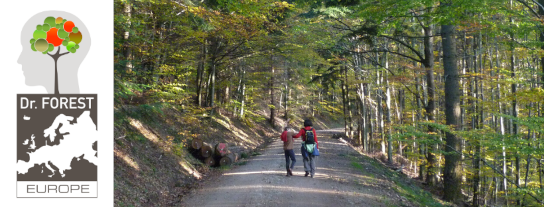Research group Biodiversity & Health
Dr. FOREST

| Contacts | Partners | Funding | Publications |
Short description
Fresh air and exercise, preferably outdoors in nature, have a positive influence on the health and well-being of people. But is the health-promoting effect in a species-rich mixed forest higher than in a spruce monoculture? In a new pan-European project called “Dr. FOREST,” scientists from the fields of ecology, medicine, biology, forestry and psychology, led by Prof. Dr. Michael Scherer-Lorenzen from the University of Freiburg, are now hoping to find out whether walking through the forest plays a role in how species-rich and diverse it is.
Existing research sites in the forests of Germany, Poland, Belgium and France serve as a platform in which researchers from Freiburg and Leipzig are investigating the extent to which the acoustic diversity of birds, frogs or grasshoppers in species-rich forests has an influence on recreation and the reduction of stress for human beings. Scientists from the University of Vienna, Austria, will measure the ozone and levels of airborne fine dust particles along with the microclimate in the forests. In addition, researchers from the University of Warsaw, Poland, will investigate the interrelationship between tree species diversity and the occurrence of medically effective plants and fungi.
In cooperation with colleagues from the INRA research institute in Bordeaux, France, and the University Medical Center in Freiburg, Scherer-Lorenzen also hopes to analyze the relationship between tree species diversity and the frequency of ticks and oak processionary moth in forests. Ticks can transmit diseases such as borreliosis and tick-borne encephalitis (TBE), whereas oak processionary moth can cause skin inflammations and attack the mucous membranes.
In order to turn theory into practice, the scientists are working together with various experts from forestry, nature conservation, tourism and the health sector. Specifically, possible recommendations for forest and health management of forests in the vicinity of large urban centers such as Leipzig, Brussels, Belgium, and Bordeaux, France, will be jointly developed and implemented on the basis of three case studies.
Aims and objectives
The Dr. FOREST research project aims to:
- Study the effects and underlying mechanisms of tree diversity in temperate forests on human health and well-being;
- Understand and predict the integrated effects of global change factors (climate change, air pollution) on biodiversity-related health issues;
- Valuate/qualify tree diversity benefits to human health and well-being, and communicate these findings to local and high-level international stakeholders.
Empirical research in existing tree diversity research sites will be performed across five main study topics: psychological restoration; microclimate, medicinal and edible plants and fungi; disease vectors; clean air; and health impact modelling and assessment. The work will be done in contrasting climatic regions of Central Europe (Austria, Belgium, France, Germany, Poland). Three case studies in urban forests will be developed and paired with three stakeholder workshops, in Belgium, France and Germany.
Contact
Kevin Raziario
Mail: kevin.rozario@idiv.de
Tel.: +49 341 9739174
Partners
- Prof. Dr. Michael Scherer-Lorenzen (Albert-Ludwigs-Universität Freiburg)
- Dr. Sandra Müller (Albert-Ludwigs-Universität Freiburg)
- Dr. Harald Auge (UFZ)
- Prof. Dr. Helge Bruelheide (Martin-Luther-Universität Halle-Wittenberg)
- Prof. Dr. Nico Eisenhauer (iDiv)
- Prof. Dr. Erich Schröger (University of Leipzig)
- Prof Dr. Kris Verheyen (Ghent University)
- Prof Dr. Bart Muys (KU Leuven)
- Dr. Bogdan Jaroszewicz (University of Warsaw)
- Prof. Anna Kiss (University of Warsaw)
- Dr. Hervé Jactel (BIOGECO)
- Prof. Dr. Douglas Godbold (Universität für Bodenkultur)
- Dr. Daniela Haluza (Medical University of Vienna)
- Prof. Dr. Quentin Ponette (Université catholique de Louvain)
Funding
The Dr. FOREST project is part of the BiodivERsA 2018-2019 Joint Call ‘Biodiversity and its influence on animal, human and plant health’. This project is funded through DFG and supported by FSU.
